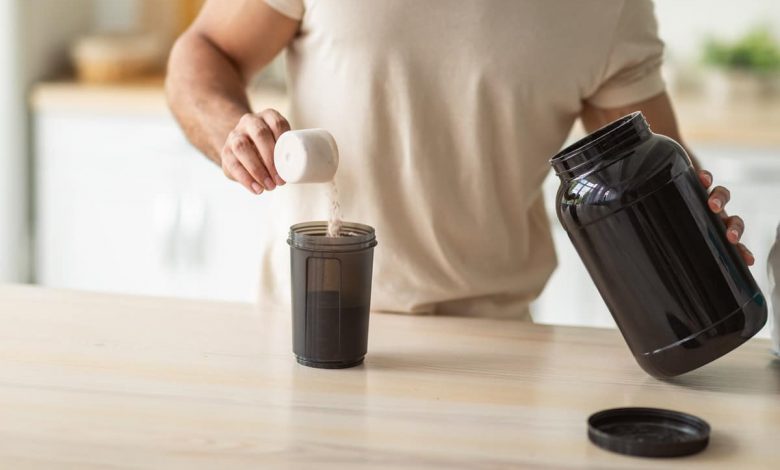Best Protein Powder For Men: Boost Muscle Growth Today

Fitness awareness among men is growing faster than ever. From urban gyms to home workouts, men are increasingly focused on building strength, gaining lean muscle, and staying fit. Amid this rising trend, one particular nutritional support stands out: protein powders. The search for the best protein powder for men is now common across online forums, fitness groups, and doctor consultations.
But with hundreds of options crowding the shelves, confusion is inevitable. Is whey protein better than plant-based powders? Should you look for muscle-building blends or lean muscle mass enhancers? Do all protein powders suit beginners?
This article is your detailed companion in that journey. Whether your goal is muscle gain, fat loss, or body recomposition, we will break down the science and logic behind choosing the best protein supplement for muscle gain. You will understand what protein powder is, its types, benefits, usage, and how to choose one that aligns with your needs and goals.
What is Protein Powder and Why Do Men Need It?
Protein powder is a concentrated form of protein derived from animal or plant sources. It is used to supplement daily protein intake, especially for those who find it hard to meet their needs through regular food. Protein is essential for muscle repair, growth, enzyme function, hormone balance, and immune health.
Men typically require more protein than women due to higher muscle mass, testosterone levels, and physical activity. Age also plays a role. After the age of 30, muscle mass begins to decline at 3–8% per decade. Supplementing with protein becomes more than a gym routine; it becomes a necessity for preserving strength and mobility.
Common scenarios where protein powder helps men:
- Regular workouts and strength training
- Gaining muscle mass
- Losing fat while preserving muscle
- Healing after injury or surgery
- Preventing age-related muscle loss
Types of Protein Powders for Men
Protein powders come in many forms. Each serves different needs and digestion rates. Here are the most commonly used ones:
1. Whey Protein
Derived from milk, whey is a complete protein with all nine essential amino acids. It is absorbed rapidly, making it ideal for post-workout recovery. It is also rich in branched-chain amino acids (BCAAs), which are crucial for muscle repair and growth. These components make whey one of the best proteins for muscle gain.
2. Casein Protein
It is also a milk protein, but it digests slowly. Hence, it provides a steady stream of amino acids, making it ideal before bedtime. It supports recovery during sleep.
3. Plant-Based Protein
These include pea, rice, hemp, and soy proteins. They suit those with lactose intolerance or vegan preferences. Many plant proteins are incomplete but can be combined to offer a complete amino acid profile. However, in recent years, many companies have been producing extremely high-quality plant protein powders.
4. Collagen Protein
Popular for skin, joints, and bone health. However, collagen is not a complete protein and is less suitable for building muscle mass.
For most men looking to build muscle, whey protein remains the best choice because of its amino acid profile, fast absorption, and strong research backing.
When you work out, your muscle fibers undergo tiny tears. Protein helps repair and rebuild these fibers. That makes them stronger and bigger. This process is called muscle protein synthesis (MPS).
Whey protein, especially when taken post-workout, rapidly increases MPS because of its BCAA content. One of the most effective components here is leucine, which triggers the muscle-building switch in the body. That is why fitness experts recommend it as the best protein powder for muscle growth.
To gain muscle, you need to have a calorie surplus and adequate protein intake. A high-protein diet also helps in fat loss by promoting satiety and preserving muscle mass during calorie restriction.
Key Benefits of Using Protein Powder for Men
Protein powders are a strategic addition to meeting nutritional and fitness goals. While whole foods should form the base of your protein intake, powders play a vital role in bridging the gap, especially for active men with high protein needs. Below are the key benefits of using muscle-building protein powder.
1. Promotes Lean Muscle Gain
Protein powder helps stimulate muscle protein synthesis, especially post-exercise. Leucine, a key amino acid found in whey, triggers this process. A consistent intake of complete proteins accelerates muscle growth, making it the best protein for muscle gain. Studies have shown that men who consume whey protein after resistance training build more lean muscle mass over time.
2. Enhances Muscle Recovery
After workouts, your muscles are inflamed and torn at a microscopic level. Quick protein intake, especially whey, helps reduce soreness and aids tissue repair. The presence of BCAAs (particularly isoleucine and valine) helps shorten recovery time, allowing you to train harder, more often.
3. Supports Fat Loss
When in a calorie deficit, the body may break down muscle for energy. Protein powder helps preserve muscle mass, which in turn sustains metabolic rate. A higher muscle-to-fat ratio leads to better fat oxidation and a leaner physique.
4. Boosts Satiety and Reduces Cravings
Protein is more satiating than carbs or fats. Supplementing meals or snacks with a shake reduces hunger pangs, stabilizes blood sugar, and helps avoid binge eating. For men focusing on body recomposition, this can be a game-changer.
5. Supports Older Men in Preserving Muscle Mass
Aging reduces muscle mass and strength. Whey protein, when combined with resistance training, helps combat sarcopenia. Older men benefit from the best protein powder for lean muscle to maintain strength, mobility, and bone density.
6. Provides a Convenient and Cost-Effective Option
Compared to animal protein sources like chicken or fish, protein powders are easier to prepare, digest faster, and are often more affordable per gram of protein. They offer an efficient way to reach your protein targets without constant meal prepping.
Potential Downsides of Protein Powders (And How to Avoid Them)
While protein powders offer many advantages, they are not without concerns. Understanding the potential downsides and addressing them can ensure safe and effective usage. Here is a breakdown of common issues and their logical explanations.
1. Digestive Discomfort
Low-quality protein powders, especially those lacking digestive enzymes, can cause bloating, flatulence, or cramps. It is due to lactose intolerance or the body’s inability to break down complex protein chains. Choosing a good whey protein for muscle building with added enzymes like papain and bromelain can reduce such discomfort.
2. Presence of Additives and Fillers
Many brands include artificial sweeteners, thickeners, and preservatives. Some of these, like sucralose or maltodextrin, can irritate the gut lining or spike insulin levels. Opting for clean-label, lab-tested powders with minimal ingredients is key to avoiding long-term side effects.
3. Risk of Heavy Metals and Contaminants
Several third-party tests have found heavy metals like lead, cadmium, and BPA in protein powders. While trace amounts may not be immediately harmful, consistent overuse can accumulate in the body. Look for products with strict quality controls and certifications.
4. Excess Protein Intake
Overconsuming protein (especially beyond 2.2 g/kg of body weight daily) can strain the kidneys over time. This risk is higher in those with pre-existing kidney conditions. Stick to suggested serving sizes and maintain hydration.
5. Potential Drug Interactions
Whey protein may interfere with the absorption of certain medications, such as antibiotics or Parkinson’s drugs like Levodopa. That is due to the interaction of protein molecules and the drug during digestion. If on medication, consult a healthcare provider before starting supplements.
When and How Much Protein Powder Should You Take?
Your protein needs depend on your body weight and activity level. As per research:
- Sedentary men: 0.8–1 g/kg
- Active men: 1.2–2 g/kg
- Muscle gain goals: Up to 2.2 g/kg
One scoop of protein powder typically provides 20–30 g of protein. You can have it:
- Post-workout for recovery
- In the morning, if you train early
- Between meals to boost daily intake
- Before bed (especially casein) to support overnight recovery
Limit intake to 1–2 servings a day and complement with high-protein foods like eggs, dal, paneer, chicken, and nuts.
What to Look for in the Best Protein Powder for Men
Here is a checklist to help you find the best protein powder for muscle growth and fat loss:
- Protein Source: Whey isolate > whey concentrate > blends > plant-based (for muscle gain)
- Protein Per Serving: Aim for 20–30 g
- BCAA Content: Especially leucine for muscle activation
- Added Enzymes: To support digestion
- Sugar and Additives: Avoid products with artificial sweeteners or high added sugar
- Lab-Tested and Certified: Look for third-party testing for purity and safety
- No Harmful Fillers: Stick to clean ingredient lists
Why Whey Protein is the Hero for Muscle Building
Among all protein supplements, whey protein consistently tops the list of best protein supplements for muscle gain. It is the gold standard, particularly for men aiming to build lean mass, recover faster, or transform their physique. But why exactly is whey considered the top whey protein for muscle building?
Whey protein is derived from milk during the cheese-making process. It contains all nine essential amino acids and is absorbed rapidly by the body, making it ideal for post-workout consumption. The high leucine content effectively triggers muscle protein synthesis, which is crucial for men looking to increase mass and strength.
Research published in the Journal of the International Society of Sports Nutrition supports whey’s efficacy. Men who supplemented with whey post-exercise had significantly better lean mass gains and performance improvements compared to those using plant-based proteins.
Its versatility, affordability, and effectiveness make it the best protein for gaining muscle mass, whether you are a gym enthusiast, athlete, or beginner.
The Best Whey Protein for Men
Among the many products available in India, HealthifyMe Whey Protein stands out. Here is why it aligns with every checkbox for men:
- High-Quality Protein: 25.5 g of protein per scoop with 5.6 g of BCAAs
- Whey Isolate + Concentrate: Blended for optimal muscle synthesis and recovery
- No Added Sugar or Preservatives
- Digestive Enzymes: For easy absorption and minimal bloating
- Sourced from Europe and lab-tested for purity
- Ideal for muscle gain and performance enhancement
All these factors make it a reliable choice as the best male protein powder, whether you are a beginner or training intensively.
How to Use Protein Powder Smartly
The effectiveness of protein powder lies in using it strategically, not in just consuming it. Understanding when, how, and in what combinations to take it can maximise your results and prevent misuse.
Timing is Key
The best time to consume protein powder is within 30 minutes of a workout. That is when your muscles are primed to absorb nutrients, especially amino acids. This period is known as the “anabolic window.” A scoop of whey during this time is often considered the best protein shake for muscle growth.
Pair with Balanced Nutrients
Combining protein powder with carbs (like oats, banana, or peanut butter) can help in better absorption and glycogen replenishment. Avoid taking protein shakes on an empty stomach unless advised otherwise.
Be Mindful of Quantity
Stick to 1–2 scoops per day based on your protein needs. More is not always better. Overuse can stress your kidneys or lead to imbalanced nutrition.
Versatile Usage
- Add to smoothies or milk
- Mix into oatmeal
- Stir into pancake or dosa batter
- Make protein-rich energy balls
The versatile usage helps maintain consistency without monotony.
How to Read the Label When Buying Protein Powder
Selecting the best protein powder for men’s muscle gain requires more than looking at the brand name. Reading the label carefully is crucial to understanding what you are consuming. Here is how to decode it:
1. Protein Content Per Serving: Look for at least 20–25 g per scoop. Anything significantly less may not be effective unless combined with high-protein meals.
2. Source of Protein: Whey isolate is purer and has more protein per gram, while concentrate contains more carbohydrates and fats. Blends of isolate and concentrate offer a balanced option for affordability and efficiency. This combination is seen in the best whey protein powder for building muscle.
3. BCAA and Amino Acid Profile: The presence of BCAAs (especially leucine) ensures effectiveness in muscle growth. A good muscle growth protein will have around 5–6 g of BCAAs.
4. Sweeteners and Fillers: Avoid powders with high amounts of sugar, sucralose, or corn syrup solids. Look for ‘No added sugar’ and natural sweeteners like stevia or monk fruit.
5. Digestive Enzymes and Certifications: Enzymes improve bioavailability and reduce bloating. To ensure product safety and quality, look for labels with FSSAI, GMP, Informed Choice, or NSF certifications.
Reading labels smartly allows you to find the best protein powder for muscle gain for beginners or seasoned lifters alike, without falling for marketing jargon.
HealthifyMe Note
Most marketing around the best protein powders to build muscle is just that: marketing. What truly matters is how well the protein powder aligns with your body, lifestyle, and goals. As a health coach, I always remind clients that no supplement can replace mindful eating, adequate sleep, and personalized fitness routines. Whey protein, when used wisely, can amplify results. But it will only sustain your muscle gains when accompanied by the right food, hydration, rest, and consistency. Understand your body, track your progress, and consult when needed. You are not just chasing gains; you are building a healthier life.
The Final Word
Choosing the best protein powder for men’s muscle gain is not about picking the most popular brand or following influencers. It is about understanding what your body needs and finding a product that delivers results without compromise.
If your goal is to gain lean muscle, speed up recovery, and feel stronger without unnecessary fillers, then whey protein is a great place to begin. You must consider high-quality blends like the one offered by Healthify Store. With its 25.5 g of protein per scoop, digestive enzymes, and clean formula, Healthify Whey Protein checks all the right boxes.
Your journey to fitness is personal. Supplements like HealthifyMe’s muscle-building protein powder should support (not replace) your efforts. Stay consistent, eat well, train smart, and choose what works best for you.
Frequently Asked Questions (FAQs)
Q: What is the best protein powder to gain muscle mass?
A: Whey protein isolate or a blend of isolate and concentrate is considered the best for muscle mass due to its high absorption rate and complete amino acid profile. Products like HealthifyMe’s Whey Protein are great examples.
Q: How much protein powder should I take daily?
A: For muscle gain, 1.2 to 2.2 grams per kilogram of body weight is recommended. Limit to 1–2 scoops of protein powder per day, and complement the rest through food.
Q: Can beginners use protein powder for muscle gain?
A: Yes, beginners can benefit from protein powders, especially if their diet lacks adequate protein. Choose clean-label products with no added sugar or artificial ingredients.
Q: What is the best time to take protein powder?
A: The best time is post-workout for muscle recovery. Other good times include mornings and before bed (casein) to ensure a continuous amino acid supply.
Q: Is protein powder safe for long-term use?
A: Yes, when taken within recommended limits. Stick to quality products that are lab-tested, and avoid excessive intake beyond daily protein requirements.
Q: Is whey protein better than plant-based protein for men?
A: Whey is better for muscle growth due to its high BCAA content and rapid absorption. However, plant proteins are suitable for those who are lactose intolerant or vegan.
Q: Can protein powder help with weight loss?
A: Yes. High-protein diets can improve satiety and preserve muscle mass while losing fat. Protein powders can help reach daily protein goals during calorie restriction.
Q: What is a good protein shake for muscle gain?
A: A good shake includes whey protein, a banana, oats, and peanut butter blended with water or milk. This combination effectively supports muscle recovery and growth.
Research Sources
1. International Society of Sports Nutrition Position Stand: protein and exercise
3. Rational Use of Protein Supplements in the Elderly—Relevance of Gastrointestinal Mechanisms
5. Effects of Protein Supplementation on Performance and Recovery in Resistance and Endurance Training
6. Protein Supplements: Pros and Cons
7. Muscle tissue changes with aging
10. International Society of Sports Nutrition position stand: protein and exercise


